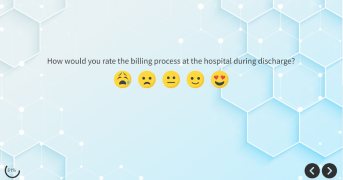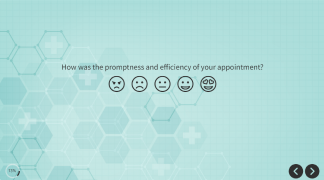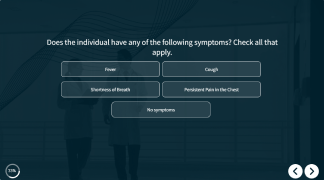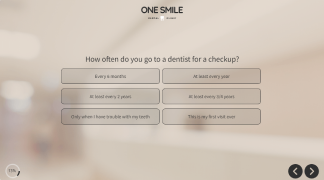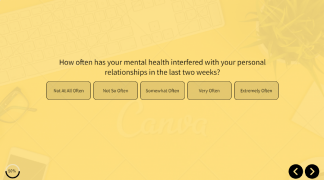Providing exceptional patient care is crucial for the success of any healthcare organization. In this endeavour, healthcare surveys serve as a powerful tool. They not only evaluate patient health but also collect vital feedback on their healthcare experiences. According to a study by the American Hospital Association, hospitals that actively engage in patient feedback see a 16% increase in patient satisfaction scores. This valuable feedback allows you to customize care plans, improve patient outcomes, and build stronger patient relationships.
A real-life example of this is the case of Mayo Clinic, which implemented comprehensive patient feedback surveys and subsequently saw a significant improvement in patient satisfaction and care quality. The insights gathered from these surveys enabled Mayo Clinic to address specific patient concerns promptly and enhance their overall healthcare experience.
The key to unlocking these benefits lies in asking the right questions—those that yield meaningful insights without overwhelming patients. Crafting questions that are clear, concise, and relevant helps in gathering actionable feedback and assessing health effectively.
In this article, we will present 30+ top patient feedback and healthcare assessment questions designed to evaluate patient health, capture their experiences, and empower you to provide outstanding care. Additionally, we will share expert tips on utilizing these questions efficiently and best practices for conducting surveys in your healthcare setting. Let’s dive in!
TL;DR
-
Health survey questions help gather data on patients' health and their feedback on their experiences with your healthcare facility.
-
You can include a range of questions in your healthcare surveys, covering questions on basic healthcare, health assessment, physical health, medical history, patient feedback and more.
-
We have included key things that you should consider while designing a health survey and the touchpoints in patient journey when you can ask them.
-
With Zonka Feedback, you can easily create health survey questions using survey templates or AI and share them across multiple channels including offline and kiosks. You can schedule a demo to know more about its features.
Assess your Patients' Health and Collect Patient Feedback
With Healthcare Surveys, understand what patients need and expect and learn ways to satisfy them.

What are the Health Survey Questions?
Health survey questions are instrumental in measuring patient satisfaction and providing insights for healthcare providers to improve their services. By selecting the appropriate health survey questions, you can gain a deeper understanding of a patient's experience, from appointment scheduling and wait times to the clarity of communication and the effectiveness of treatment plans.
💡Health survey questions, also known as a health questionnaire, consist of a series of questions aimed at gathering information from patients about their health conditions and their feedback on the care and treatment they receive.
Companies from various industries also use health surveys for various purposes, such as improving product features, assessing employee well-being, and refining internal processes. For instance, Apple has used health surveys to gather feedback on their health-related products, such as the Apple Watch, to improve features and functionality based on user experiences. During the pandemic, Zonka Feedback utilized health survey questions to assess employee well-being and health status.
Let's review some sample healthcare surveys to understand what these surveys look like.
Sample Healthcare Survey Questionnaires
Exploring sample healthcare assessment surveys can provide a solid foundation for creating effective health surveys tailored to your specific needs. These templates offer a variety of questions that can be used. These healthcare survey example questionnaires can be edited, modified, and customized as per your survey needs. Below are some sample healthcare survey templates available for immediate use:
By utilizing these templates, healthcare providers can quickly implement surveys to capture valuable feedback. Zonka Feedback allows you to easily edit, modify, and customize these templates to better fit your specific survey needs, ensuring you gather the most relevant and actionable insights.
30 Best Healthcare Survey Questions You Should Ask
There are several types of questions that you can include in your health surveys. We are sharing some of the best healthcare survey questions here that will help you find meaningful patient insights about their well being as well as their opinions about your healthcare services.
You don't need to use all the questions in your survey, your can choose the best healthcare survey questions that suit your survey requirements. We have divided these questions into various categories to make it easier for you to choose the right ones as per your survey needs.
Basic Healthcare Assessment Questions
Basic health assessment questions help you to know the basic health conditions of your patients and their mindset about their health. The health assessment survey with these healthcare survey questions lets you know the health status of your patients and how much they are aware and conscious about their health. Here are some healthcare assessment example questions:
1. How healthy do you consider yourself on a scale of 1 to 10?
This health assessment question is important in a healthcare survey as it provides a subjective assessment of the individual's perceived health status. While this question may not provide clinical data, it offers valuable insights into the individual's self-perception of their health, which can influence their healthcare-seeking behavior and overall well-being.

2. How often do you get a health checkup?
-
Once in 3 months
-
Once in 6 months
-
Once a year
-
Only when needed
-
Never get it done
-
Other
This health assessment question helps assess the frequency of health checkups, providing insights into individuals' proactive approach to healthcare and their adherence to preventive care guidelines. Understanding this can help you recommend appropriate screening and preventive measures, potentially identifying health issues early and improving overall health outcomes.
3. What do you say about your overall health?
-
Having Good Physical Health
-
Moderately physically impaired
-
Severely physically impaired
-
Totally physically impaired
This health survey question gauges individuals' perceptions of their overall health, providing valuable insights into their self-assessment. Understanding patients' views on their health can help you tailor care plans to address their specific needs and concerns, ultimately improving patient satisfaction and outcomes.
Demographic and Lifestyle Questions
Demographic and lifestyle questions help you gather essential background information about your patients, which can be crucial for understanding their health behaviors and tailoring care accordingly.
4. What is your age group?
- Under 18
- 18-20
- 21-35
- 36-60
- Above 60
This question helps categorize patients into different age groups, allowing for age-specific insights and care recommendations.
5. Do you smoke?
- Yes
- No
- Occasionally
- Used to, but quit
Understanding smoking habits is essential for assessing health risks and providing targeted interventions to promote better health outcomes.
6. How often do you consume alcohol?
- Daily,
- Weekly
- Monthly
- Yearly
- Never
This question assesses alcohol consumption patterns, which can impact overall health and help in creating personalized care plans.
7. Are you physically active?
- Yes
- Regularly
- Occasionally
- Rarely
- No
Knowing the patient's physical activity levels can help tailor exercise recommendations and improve overall health and well-being
General Patient Feedback Questions
General patient feedback questions help you collect patients' opinions about their experiences with general aspects of the hospital or healthcare center like appointment booking, pharmacy staff conduct, hygiene and cleanliness of the hospital premises and more.
8. How long did you wait beyond your appointment time to be seen by a provider?
This question evaluates the efficiency of healthcare facility operations and patient flow management. Understanding patients' wait times beyond their scheduled appointment can highlight areas for improvement in scheduling and resource allocation, ultimately enhancing patient experience and satisfaction.
9. How well do you feel the provider listened to your health concerns?
This particular question is most important in a questionnaire for health survey as it assesses patient-provider communication and empathy, which are crucial for patient satisfaction and treatment effectiveness. Understanding patients' perceptions of how well their concerns are listened to can help you improve their communication skills and patient-centered care approach.
10. Please rate how thorough you feel the provider’s instructions for care were
This question evaluates patients' perceptions of the clarity and comprehensiveness of the care instructions provided by the healthcare provider. Understanding patients' views on the thoroughness of care instructions can help healthcare providers improve their communication effectiveness, ensuring that patients have a clear understanding of their care plans and can adhere to them properly for better health outcomes.

11. How well do you feel the provider answered your questions?
This question assesses patients' satisfaction with the provider's ability to address their queries effectively. Understanding patients' perceptions of the provider's responsiveness can help you improve their communication skills and patient-centred care approach, ultimately enhancing the quality of care provided.
12. How was our pharmacy staff?
This one in health assessment questions to ask patients aims to assess the patient's experience with the pharmacy staff, including factors such as professionalism, helpfulness, and efficiency. Understanding patients' perceptions of the pharmacy staff can help you identify areas for improvement in customer service and patient care coordination.
13. How satisfied are you with the cleanliness of our facility?
This smiley face survey question seeks to understand patients' satisfaction with the cleanliness of specific areas within the healthcare facility, such as waiting areas, examination rooms, and restrooms. Feedback on cleanliness helps healthcare providers identify and address cleanliness issues promptly, ensuring a comfortable and hygienic environment for patients and staff.

14. How would you rate the overall care you received from your provider?
By using a survey rating scale question, you can quantitatively measure patients' satisfaction with the care they received from their provider. This allows for easy comparison and analysis of responses, helping you identify trends and areas for improvement.
Additionally, a rating scale question provides a standardized way to collect feedback, making it easier to track changes in patient satisfaction over time and assess the impact of any improvements made to the care delivery process.
15. How easy was it to schedule an appointment at our facility?
This question in health assessment questions assesses the ease of scheduling appointments, offering insights into the patient experience with appointment booking processes. Understanding this can help you streamline appointment scheduling workflows, improving access to care and overall patient satisfaction.

16. How likely are you to recommend our facility to your friends and family?
This Net Promoter Score question helps gauge patients' likelihood of recommending the healthcare facility to others. NPS in healthcare is a widely used metric as it provides a simple yet effective way to measure patient satisfaction and loyalty. Understanding patients' likelihood to recommend the facility can help identify areas for improvement and track changes in patient satisfaction over time.
Health Questionnaire with Core Healthcare Assessment Questions
These are the questions that primarily focus on assessing the health conditions and the overall well-being of the patients. The response data so collected from these general health assessment questionnaires helps doctors to give the right treatment and medical care that the patients should receive.
17. Do you have any chronic diseases?
-
Yes
-
No
This question is extremely popular in yes or no surveys to quickly gather information about an individual's health status. It is a key component of health assessments, allowing healthcare providers to tailor their care plans to meet the specific needs of patients with chronic conditions.

18. Do you have any hereditary conditions/diseases?
-
High blood pressure
-
Diabetes
-
Hemophilia
-
Thalassemia
-
Huntington
-
Other (Please specify)
This question captures whether respondents have any hereditary conditions or diseases that may run in their families. Understanding these genetic predispositions can help you assess the individual's risk factors and offer targeted screenings, interventions, and preventive measures. By understanding the hereditary conditions or diseases that individuals may have, you can develop tailored care plans that address their unique health needs and risks.
19. Are you habitual to drugs and alcohol?
-
Yes to both
-
Only to drugs
-
Only to alcohol
-
I am not habituated to either
This question in the healthcare questionnaire is designed to gather information about individuals' habits regarding drug and alcohol use. Understanding these habits is crucial for healthcare providers to assess the potential health risks associated with substance abuse and to provide personalized care plans that address substance abuse issues and promote overall health and well-being.
20. Over the past 2 weeks, how often have you felt nervous, anxious, or on edge?
-
Not all
-
Several days
-
More days than not
-
Nearly every day
This question regarding anxiety is important in a healthcare survey because it can uncover potential mental health concerns. Anxiety is a common symptom of various conditions, and by identifying patients who experience it, healthcare providers can delve deeper and offer appropriate support or referrals.
21. Over the past 2 weeks, how often have you felt down, depressed, or hopeless?
-
Not all
-
Several days
-
More days than not
-
Nearly every day
This question gauges the frequency of feelings of sadness, depression, or hopelessness of the patients over the past two weeks. Understanding the frequency of these feelings can help you assess the individual's mental and emotional well-being, particularly in identifying symptoms of depression.
22. Over the past 2 weeks, how often have you felt little interest or pleasure in doing things?
-
Not all
-
Several days
-
More days than not
-
Nearly every day
This healthcare survey question assesses the frequency of anhedonia, which is a core symptom of depression characterized by a reduced ability to experience pleasure or interest in activities that were once enjoyable. Understanding the frequency of these feelings helps healthcare providers assess the individual's mental and emotional well-being and identify symptoms of depression.
23. How would you describe the condition of your mouth and teeth, including false teeth or dentures?
-
Excellent
-
Good
-
Average
-
Poor
This question gathers information about the individual's oral health. Understanding the condition of the mouth and teeth is important for healthcare providers to assess oral health status, provide appropriate dental care, and offer guidance for maintaining good oral hygiene.
24. How often do you have trouble taking medicines the way you have been told to take them?
-
I do not have to take medicine
-
I always take them as prescribed
-
Sometimes I take them as prescribed
-
I seldom take them as prescribed
This health survey question is designed to assess the individual's adherence to medication instructions. When you understand the frequency of difficulties faced by patients in taking medications as prescribed, you can identify potential barriers to adherence and provide appropriate support and interventions to improve medication adherence.
25. On how many of the last 7 days did you engage in moderate to strenuous exercise (like a brisk walk)?
-
0 Day
-
1 Day
-
2 Days
-
3 Days
-
4 Days
-
5 Days
-
6 Days
-
7 Days
Through this health survey question, you can evaluate the individual's physical activity levels, which is important for maintaining overall health and well-being. Based on the response, you can suggest personalized exercise recommendations to improve fitness and reduce the risk of chronic diseases.
26. In general, would you say your health is:
Understanding how individuals perceive their health is important because it provides a starting point for healthcare providers to understand individual's well-being and tailor their care plans to address specific health needs. Additionally, using open-ended questions can allow patients to describe their health understanding in their own words which can serve as a baseline for tracking changes in health over time and evaluating the effectiveness of interventions.

Questionnaire on Health Care Facilities and Hospital Feedback
Hospital feedback questions ask the patients to share feedback about their experiences with your hospital and the healthcare facilities and services the hospital provides. The responses to these questions also help you track your hospital's performance as compared to other hospitals in the industry.
27. How would you rate the diagnosis process that you experienced?
-
Excellent
-
Above average
-
Average
-
Below average
-
Very poor
This question in healthcare surveys is used to assess patients' satisfaction with the diagnosis process they experienced. Understanding patients' perceptions of the diagnosis process using 5-star surveys can help you identify areas for improvement such as communication, timeliness, and thoroughness in a quantifiable manner.

28. Overall, how do you rate us as compared to other local hospitals in your area?
-
Excellent
-
Above average
-
Average
-
Below average
-
Very poor
Understanding patients' perceptions of the hospital's performance relative to others can help healthcare providers identify areas for improvement and enhance the quality of care provided. This comparison provides valuable insights into the hospital's strengths and weaknesses compared to its peers, allowing for targeted efforts to improve patient satisfaction and outcomes.
29. What is the difference in the care provided by the hospitals available in your area?
This health survey question helps healthcare providers gain insights into the perceived strengths and weaknesses of different hospitals, which can be valuable for identifying areas for improvement and enhancing the overall quality of care in the community. Understanding these differences can also help patients make informed decisions about where to seek care based on their preferences and needs.

Primary Care Provider Feedback Question
Your doctors and physicians are the primary health care providers in your hospital or clinic and thus impact patient experience the most. This patient feedback question helps you assess how well your doctors or physicians are able to diagnose your patient's health problems and prescribe medication and treatment accordingly.
30. Is your primary healthcare physician able to conduct a quick diagnosis and prescribe medication?
This health question helps to understand patients' experiences with their physician's diagnostic and prescribing practices. It provides insights into the efficiency and effectiveness of the physician's approach to diagnosis and treatment, which is crucial for ensuring timely and appropriate care.
Secondary Care Provider Feedback Questions
Apart from the doctors, there are some secondary medical staff and services that also play a great impact on the overall patient experience. These questions help you gather patient feedback about those services.
31. Did the pharmacy staff collect the right deductible from you for your medicines?
This healthcare question helps you identify any issues or discrepancies in billing practices and ensures that patients are billed accurately for their medications. Understanding patients' experiences with deductible collection can also help improve the overall patient experience and satisfaction with pharmacy services.
32. How would you rate our ambulance service?
-
Excellent
-
Good
-
Average
-
Poor
This health survey question helps you to identify areas for improvement and enhance the quality of emergency medical care. It allows patients to provide feedback on the timeliness, professionalism, and effectiveness of the ambulance service, which can help healthcare providers make informed decisions to improve their emergency medical services.
Questions about Health Insurance
Healthcare insurance is an important part when it comes to healthcare industry. Questions about healthcare insurance help you know whether your patients are insured with a good health insurance package or not. Here are some questions about the health insurance of the patients.
33. Please state your level of agreement to the statement: Health insurance is affordable to you.
This health insurance survey question assess individuals' perceptions of the affordability of health insurance, which can impact their access to healthcare services. Understanding individuals' perspectives on health insurance affordability can help policymakers and healthcare providers develop strategies to improve access to healthcare for all.
34. Has any of your family members been dropped out of coverage after a diagnosis of any illness?
This healthcare insurance survey question can help identify potential gaps or challenges in the healthcare system that may impact individuals' access to care. It provides insights into the impact of health insurance policies on individuals and families, highlighting areas where improvements may be needed to ensure continuous coverage for those with health conditions.
What to Consider While Designing a Health Survey Questionnaire?
Designing an effective health survey and patient feedback questionnaire involves several crucial factors that drive higher response rates and gather meaningful insights. Let's explore the key aspects to consider when designing a healthcare survey questionnaire.
1. The 'What' and 'Who' of Healthcare Survey
Here are the two most important factors that you must consider before creating your health survey:
-
Survey Goals: Before designing your questionnaire or choosing survey questions, always keep your survey goals in mind. Determine what answers you intend to derive from your patients. A well-defined survey goal leads to better planning and good planning will help you to position your survey in a better way to collect valuable and actionable patient feedback.
-
Target Audience: Identifying your target audience will not only help you to streamline your health survey but also provide you with a great understanding of choosing valuable questions. Always keep the respondent’s place, age, maturity and cognition in mind while designing health questionnaires for your patients.
2. Use Cases of Health Assessment Survey
Health assessment surveys are invaluable tools for gathering essential data and insights across various sectors. These surveys enable healthcare providers, companies, and educational institutions to monitor health conditions, improve satisfaction, identify risks, and tailor interventions. By strategically deploying these surveys, organizations can enhance service delivery, ensure continuous care, and support overall well-being. Here are some key use cases where health assessment surveys can be effectively implemented.
-
Remote Health Monitoring - You can share your health survey questionnaire to the patients when you are doing remote health monitoring at patients' homes or in some remote areas like villages.
-
Improve Patient Satisfaction - When you feel there is a need to gauge and improve satisfaction of your patients, you can ask them healthcare feedback questions. This will help you know their concerns with your patient care facilities and you will be able to take the right action on them to improve patient experience.
-
Identifying Early Risks: Targeted surveys can screen for potential health issues like diabetes or depression. By capturing early warning signs, you can intervene promptly and improve patient outcomes.
-
Tailoring Treatment Plans: Healthcare surveys can assess a patient's lifestyle, habits, and medication adherence. This comprehensive data helps you to personalize treatment plans for optimal effectiveness.
-
Public Health Monitoring: Large-scale health surveys can track the spread of infectious diseases, monitor vaccination rates, and identify areas with specific health concerns. This data empowers public health officials to allocate resources effectively and safeguard population health.
- Corporate Wellness Programs: Companies can survey employees to assess their health and wellness. These surveys can provide insights into workplace stress, physical activity levels, and overall well-being, helping employers create targeted wellness programs and support employee health.
- Educational Institutions: Schools and universities can use health surveys to monitor the health and wellness of students. This can include assessing mental health, dietary habits, and physical activity levels, enabling institutions to provide better support and resources for student well-being.
By leveraging health assessment surveys in these use cases, organizations across various sectors can gather valuable data that informs decision-making, improves outcomes, and enhances overall service delivery.
3. Touchpoints in Patient Journey
Identifying the right touchpoints in the patient journey is crucial for gathering meaningful feedback and making informed improvements. Here are the key touchpoints for different healthcare settings:
Hospitals or Clinics
Hospitals and clinics provide both inpatient and outpatient services. For inpatients, the journey includes admission, treatment during their stay, and post-discharge care. For outpatients, the journey involves appointment booking, pre-consultation, consultation, and follow-up care.
For Inpatients
- Admission: Collect feedback on the admission process, including ease of registration and initial interactions with staff.
- During Stay: Gather ongoing feedback about the quality of care, communication with healthcare providers, comfort, and cleanliness of the facility.
- Post-Discharge: Send surveys to patients after discharge to understand their overall experience, including discharge instructions, follow-up care, and any challenges faced after leaving the hospital.
For Outpatients
- Appointment Booking: Evaluate the ease and efficiency of booking appointments through online systems, phone, or in-person.
- Pre-Consultation: Assess the check-in process, wait times, and initial interactions with front desk staff.
- Post-Consultation: Gather feedback on the consultation itself, including the provider's communication skills, clarity of diagnosis, and treatment plans.
- Follow-Up: After treatment or consultation, send surveys to understand patient satisfaction with the care received and any additional support needed.
Aged Care
Aged care facilities focus on providing long-term care and support to elderly residents. Ensuring the well-being and satisfaction of both residents and their families is essential for delivering high-quality aged care.
- Admission Process: Collect feedback on the initial admission process, including interactions with staff and the ease of transitioning into the aged care facility.
- Daily Living: Regularly gather feedback on daily care, activities, food quality, and the overall environment to ensure the residents' comfort and well-being.
- Family Feedback: Engage with the families of residents to gather their perspectives on the care provided and any concerns or suggestions they might have.
- Health Check-Ups: After routine health check-ups or medical treatments, collect feedback on the healthcare services provided within the facility.
Pharmacy
Pharmacies play a crucial role in the healthcare system by dispensing medications and providing essential pharmaceutical care. Ensuring a positive experience at every touchpoint is vital for patient satisfaction and medication adherence.
- Prescription Drop-Off: Assess the efficiency and friendliness of staff during the initial prescription drop-off.
- Waiting Time: Gather feedback on the time taken to fill prescriptions and the waiting experience.
- Medication Counseling: After receiving medications, ask patients about the clarity of instructions provided by the pharmacist and their satisfaction with the counseling received.
- Overall Experience: Collect feedback on the overall experience at the pharmacy, including ease of access, availability of medications, and staff professionalism.
Harnessing the Power of Health Assessment Surveys with Zonka Feedback
Healthcare surveys are a game-changer for effective patient care. By incorporating well-designed questions, you can personalize patient treatment plans, improve satisfaction by addressing areas for improvement, and potentially detect health risks early on for better outcomes. These surveys provide the data you need to make informed decisions for program development, resource allocation, and continuous improvement initiatives.
You can easily build a healthcare ecosystem that prioritizes patient-centred care and optimal health outcomes by using a robust healthcare survey tool. Zonka Feedback is one such survey tool that not only captures inpatient and outpatient feedback on iPad and Android Tablets but also acts as website survey tools to capture feedback through the website and other channels like email and SMS but also enables you to analyze and manage feedback responses. Leveraging its patient feedback survey templates, sentiment analysis, automated workflows, and real-time reporting and analytics, you can capture and measure patient satisfaction and close the patient feedback loop.
With advanced sentiment analysis, the tool can automatically detect patient emotions and highlight critical feedback that requires immediate attention. AI-driven insights help identify trends and patterns, enabling healthcare providers to make proactive improvements. Automated workflows ensure that feedback is routed to the right team members promptly, facilitating swift resolution and continuous quality enhancement.
Conclusion
Collecting patient feedback through health surveys is one of the most effective ways to improve the quality of care and overall patient satisfaction. The 30+ questions shared in this guide will help you create meaningful surveys to gather valuable insights. Start using them today to deliver better healthcare experiences and build stronger patient relationships.
